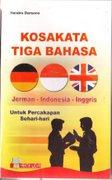For many people, New Year’s Eve usually relates to happiness. It is time to have fun by getting together and by hanging around. They celebrate it in many ways. Indeed, there are many ways of welcoming the new year. It seems that New Year’s Eve is a different day. On New Year’s Eve, the atmosphere is very different from the other days. People, especially teenagers, hang around or hold a party. Discotheques, pubs, and other prestigious places offer special programs. When we walk down the streets, we will see the crowd. Maybe some of us still remember the party held in Jakarta several years ago. It was called a ‘fireworks party’. It is said that the project spent so much money. Sometimes a question crosses my mind,”Was the party really useful?” To tell you the truth, I doubt about the usefulness of such a party. I think it would have been better for the committee to use the money to help the poor.
As a matter of fact, New Year’s Eve is a high time for self-introspection. In other words, it is the right moment for us to make a reflection of what we have done in the previous year. From our reflection , we can decide our next steps to better our life in the future.
Although making resolution can be done in any day, it also sounds wise if we do it on New Year’s Eve. If some of us like writing a diary, the diary can be used as a tool for making evaluation of what we have done during the year. Doing so, we can identify our strengths and weaknesses.
The following are suggestions for our New Year’s Eve ‘programs’.
Firstly, we can make the best day on New Year’s Eve by having a self-introspection (self-correction) and it is related to making a reflection and contemplation. Unfortunately, a lot of people misinterpret the meaning of New Year’s Eve. People tend to have fun until they forget everything. Even worse, they spend money on useless things.
Secondly, on this special day, we can do some good things. We should thank God for His blessings. We should be grateful that we are healthy and we are still able to have the New Year. Certainly, we need to avoid doing anything useless, such as drinking liquor or riding a motorcycle in a reckless way. Overacting, dancing excessively, and crying out wildly should also be avoided.
When we have reflected on our mistakes, we may start our new life. As the saying goes,”Experience is the best teacher,” it is wise that we learn from our experiences. We should make use of our failures to motivate ourselves to achieve success in the future. Now, let’s make a resolution that we will better ourselves and use our time wisely. Let’s welcome the New Year with a new start, new hope, and new spirit. Happy New Year 2008!
(Artikel saya di atas pernah dimuat di Majalah DIALOGUE 11/XXI-1997.)






